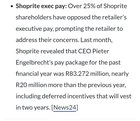The private security firms operating CIT trucks have semi-auto weapon wielding ex-military, or ex-Southern African military afrikaans men driving them from places like the Congo. They deliberately randomize their driving patterns and time tables, and often, depending on the scale of their clients like banks or shopping mall centers, call in to come collect cash on odd and unpredictable hours, so as to deliberately avoid bandits not being able to ambush or predict their driving patterns.
CIT trucks are the highest paid and most prestigious positions for mercenaries or private-security personnel, do to the obvious and extreme risk of targeting by gangs, thieves and highway bandits
https://www.g4s.com/en-za/what-we-do/services/cash-in-transit
The most infamous CIT truck company is G4S, because they serve the "smallest" small businesses as well, like singular restaurants or chain stores and groceries. Safricans will often see the famous G4S CIT truck parked in odd and unpredictable hours in front of your SPAR grocery store, or Shopping Mall, with two heavily armed mercenaries, in bullet-proof vests and semi-autos like R4 rifles flanking the truck as lookouts, while a 3rd man is doing the unloading or loading of cash alongside the shopowner or whatever.
https://www.facebook.com/permalink.php/?story_fbid=327197606071992&id=105789421546146
But there's much more specialized private CIT companies servicing larger retailers and banks with much more hardcore trucks
https://www.armoredcars.com/armored-vehicles-f  or-cash-in-transit/
or-cash-in-transit/
"Why Choose The Armored Group
The Armored Group began manufacturing armored vehicles back in 1992. Since then, we have amassed the knowledge, experience, and certifications that make us a leading armored vehicle supplier for countries around the globe. Our original focus when forming TAG was on cash-in-transit vehicles and providing our clients with higher levels of security. To this day, we proudly remain a producer and seller of high-quality CIT trucks that help keep personnel and valuables worldwide safer during transport. "
So how did a CIT system even begin to exist in the 1st place - it's because since 2002, the SA Police has been less than useless, and any place that needs to transport or banks large cash deposits from the week's revenue like gas-station shops or restaurants, were becoming incresingly vulnerable and targeted by robbers and gang syndicates.
Police would just never arrive, and private security companies would fill the void left by the government - combined with many white ex-military men being expulsed by the ANC regime, this led to an industry becoming the norm in South Africa by 2005.
On the other hand, CIT robberies has also become commonplace in South Africa, making CIT guards, the most dangerous job in the country by any metric.
====(from iol article)
It's a thankless job for the guards in armoured vehicles who make the trips, sometimes through life and death situations, to top up the cash supply at your neighbourhood ATM.
They are also responsible for the money at pension payout points and retail outlets. Cash-in-transit heists have become so common in South Africa, with daily shootings and bombings, that security experts are calling it an epidemic.
Last year was a particularly bad one for the industry. At the start of 2020, there was nearly one heist per day. In many cases, the armoured vehicles were bombed.
This year's figures also make for grim reading. *29 heists nationwide in September alone *7 robberies so far in October *14 cash guards were killed on duty since January 1
Cash guards, despite their extensive training, state-of-the-art vehicles, and accompanying air support, know they are the targets of sophisticated syndicates.
Guards are aware that theirs is one of the riskiest jobs in the world. Still, there are at least 7 000 directly involved in cash deliveries and collection and are the beating heart of this multi-billion rand industry.
=====
Another cash-in-transit guard who spoke to Weekend Argus on condition of anonymity, recalled an attack on his team by heavily armed men who sprayed their armoured vehicle with bullets.
The criminals made off with several boxes of cash. He lay on the ground shot. "My life flashed before my eyes."
He said his company trucks transport between R4 million and R6m per vehicle per day, and that figure swells to R10m at the end of the month.
"And you do have banks who deposit even bigger amounts," the guard said.
Latest crime figures show a decrease in cash-in-transit robberies.
Brigadier Vish Naidoo from the South African Police Service said: "The rate of cash-in-transit heists has gone down substantially because of the interventions that we have put in place.
=====(end quote)
Some examples of CIT trucks/vehicles bombed previously
https://www.citizen.co.za/rekord/news-headlines/2022/04/12/cit-truck-bombed-in-atteridgeville/
"afetee hy's vol kak" 








=====
======
======
======
CIT transports have become so ubiquitous to Safrican business, that many warning signs had popped up to tell robbers that the Safe keys are not kept on premises
they are explicitly only given to CIT companies, to further the safety of workers at places like gas-stations or convenience stores.







 blowing up a CIT (Cash-In-Transit) Vehicle on highway. CIT trucks are fortified bunker vehicles which transport naked cash from supermarkets, groceries and ATMs to banks. Depending on the private company, they have bullet-resistant windows, solid rubber tires and plated shielding like safes; and like safes they have combination-lock back doors.
blowing up a CIT (Cash-In-Transit) Vehicle on highway. CIT trucks are fortified bunker vehicles which transport naked cash from supermarkets, groceries and ATMs to banks. Depending on the private company, they have bullet-resistant windows, solid rubber tires and plated shielding like safes; and like safes they have combination-lock back doors. 























Jump in the discussion.
No email address required.
Jump in the discussion.
No email address required.
This isn't about accounting nimrod. I'm saying there are thousands of clauses and legal buttfrick trapdoors in a contract. You can't take three coke addicts from the street, pay them $10 and tell them to pretend tough and shit. Even in post Katrina Louisiana when Blackwater was hired to guard mortuaries (to stop illegal claims of dead bodies, literally guarding dead bodies in a flooded city lmao) they had to go through rigorous (at least on paper) federal as well as local laws. That was 20 people. Even without any tender, the direct contract still took 2 weeks. Because of liabilities.
A single background check of 13000 people processed and verified on both ends by G4S and the UK Govt would probably take 6 months to complete.
Jump in the discussion.
No email address required.
More options
Context
More options
Context